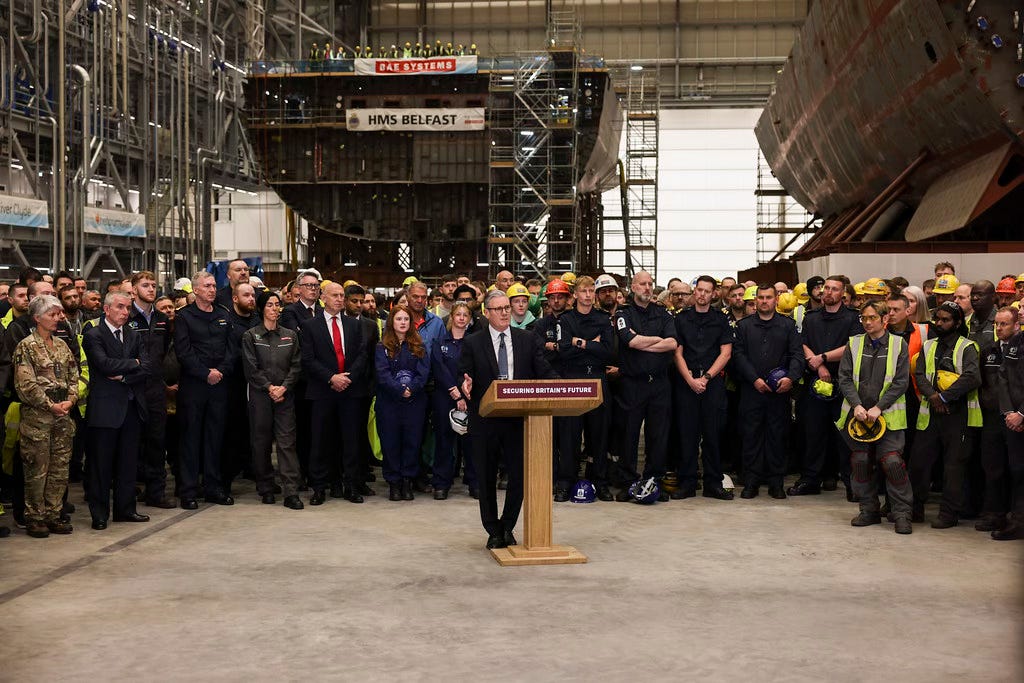“The front line, if you like, is here,” said Keir Starmer today, who insisted that Britain’s defence spending priorities for the next decade, laid out in a long-awaited document, will allow the UK to deliver “peace through strength”.
The PM has, however, refused to commit to a date for reaching the government’s 3 per cent defence spending target. Instead, speaking today from Glasgow to mark the publication of the 130-page Strategic Defence Review (SDR), he told reporters: “We will raise defence spending to 2.5% of GDP by 2027, and set the ambition to hit 3% in the next Parliament, subject to economic and fiscal conditions.”
Today’s report - which focuses heavily on the “immediate and pressing” threat posed by Russia - includes plans to build 12 new attack submarines, spend £15 billion on the nuclear warhead programme and invest £6 billion on munitions to replenish UK stockpiles. All of which, insists Starmer, will move Britain’s armed forces to “war-fighting readiness”.
The PM was equally keen to stress that acting on today’s report will enable the UK to “accelerate innovation at a wartime pace”.
The review - which acknowledges that drones, cyber and AI are dramatically changing the nature of warfare - has set out a new approach to how the army will fight. An “autonomy drive” will aim to reduce troop casualties, for instance, by focussing on deploying drones to allow soldiers to remain further from the front line until a later stage of battle.
Such reforms feel especially relevant in light of the bold new example of drone warfare conducted by Ukraine. Yesterday, Kyiv conducted a major attack against multiple air bases in Russia, destroying 40 Russian warplanes, in what some pro-Kremlin bloggers have even gone so far as to describe as “Russia’s Pearl Harbour”.
The Ukrainian operation - which used small drones smuggled into Russia then hidden in mobile sheds and launched off the back of trucks into Russian airfields - was a clear demonstration of how new technology has transformed the battlefield.
At the same time, the mission - thought to be a culmination of one and a half years of planning - is also a demonstration of traditional special forces guile.
On the subject of traditional forces, one of the biggest challenges for the UK military will be addressing the recruitment and retention crisis. The RAF, navy and army have failed to hit their hiring targets every year for a decade and UK Defence Secretary John Healey admitted recently that he cannot increase the size of the armed forces until the next parliament — from 2029 onwards. The SDR has recommended spending £1.5 billion to improve the poor state of housing for the country’s armed forces as a first step to tackle this.
The government is expected to accept the report’s recommendations in full. But funding them will be a challenge.
Starmer brought forward his announcement to raise defence spending to 2.5 per cent of GDP, originally intended for today, to coincide with his trip to the White House. But his caveat this morning that the subsequent hike to 3% of GDP, is “subject to economic and fiscal conditions,” shows it is not guaranteed. Without it, the affordability of the review’s long-term recommendations is already in question, because the SDR’s authors say several of the more ambitious initiatives - such as the acceleration of submarine production - were contingent on the 3 per cent target being hit.
Even funding the smaller 2.5 per cent pledge is no small ask. We’ve already seen Starmer cut the overseas aid budget and make painful social welfare cuts in a bid to balance the books.
Since then, he has backtracked on winter fuel payment cuts and is thought to be considering scrapping the two-child limit for benefits in a bid to stave off a backbench rebellion.
Against this backdrop, Paul Johnson, director of the IFS, warned today that, when it comes to meeting Britain’s defence spending pledges, “bluntly, it really does seem to me that the only choice that’s available is some really quite chunky tax increases”.
Caitlin Allen
Deputy Editor
ON REACTION TODAY
Iain Martin
Britain’s economy and our politics were broken by the financial crisis
Ian Stewart
Britain, the migration nation
ALSO KNOW
Terms over prisoner exchange agreed as Russia deals with massive air strike - Ukraine and Russia are working on a new prisoner exchange, according to President Volodymyr Zelensky, following Monday’s round of peace talks in Istanbul. The head of the Ukrainian delegation has said that direct talks between Zelensky and Vladimir Putin have also been discussed.
Three Palestinians killed near food distribution site - Israeli forces in the Gaza Strip opened fire as Palestinians headed towards the Gaza Humanitarian Foundation food distribution site at about sunrise on Monday, killing at least three people and injuring dozens, according to health officials and a witnesses. The shooting occurred at the same location where witnesses say Israeli forces fired a day earlier on crowds of people heading towards the food distribution hub, killing 31 and injuring over 170. The Israeli military said it fired warning shots on Monday towards “several suspects who advanced toward the troops and posed a threat to them”, and denied it was preventing people from reaching the site.
Labour backlash to Reeves’s fiscal policy - According to polling conducted by Survation, shared exclusively with The Times, 65 per cent of Labour MPs believe the Chancellor should change her fiscal policy course. One in five favour tax rises over spending cuts and a third say that Reeves’s self-imposed fiscal rules - which prevent her from borrowing to fund day-to-day spending and will likely lead to large departmental budget cuts - should be reformed.
Conservative candidate wins Polish presidential election - Right-wing historian Karol Nawrocki has been elected as Poland’s new president, winning 50.9 per cent of the vote. His opponent, liberal Warsaw mayor Rafal Trzaskowski, had claimed victory after the first exit poll but a significant turnaround ended with him achieving 49.7 per cent. An avid supporter of Poland’s sovereignty and of traditional family values, Nawrocki is against PM Donald Tusk’s pro-EU programme and has expressed his admiration for Donald Trump.
FIVE THINGS
Cheaper food or a compromise on standards? Manoj Dora in The Conversation on why the UK’s trade deal with the US is sounding alarm bells.
Ukraine’s deep strike. Peter Caddick-Adams in Engelsberg Ideas.
The Spectator on the first Labour councillor to defect to Reform.
Trump always chickens out on foreign policy, says Gideon Rachman in the Financial Times.
Rania Abouzeid in The New Yorker: Who gets the guns in Lebanon?





